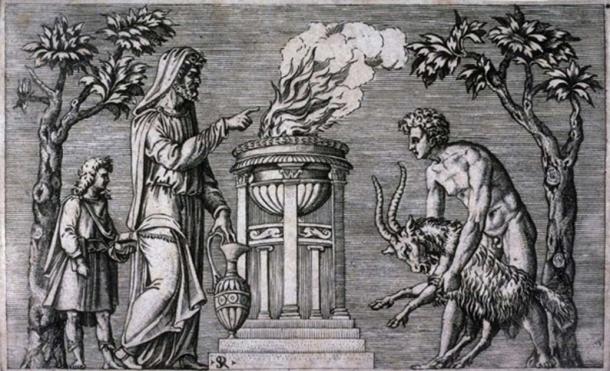
On this, the longest night, they waited. Waited in the Scandinavian darkness for the return of the life giving sun. They burned bonfires with Jul logs, crisp and crackling. The return of the sun brought hope that once again summer would come, the fields would ripen and food would be abundant.

Druid priests slaughtered a white bull and gathered mistletoe, believed to be a magical plant. Likewise, the people slaughtered the last of their animals. The meat was salted and stored, in hopes of warding off starvation for the remaining winter.
In what is now the United Kingdom, monuments had been built, by the ancestors or others that came before them, awe-inspiring and bold as they stand to this very day. Perhaps an ancient race of giants or aliens had dragged the megalithic rocks that would form Stonehenge and Newgrange. Somehow this ancient race had aligned the rocks perfectly to catch the rising of the solstice sun. It was here the Druid priests performed their rituals.

During the endless night of Winter Solstice, it was believed that spirits of the dead walked the earth. These were the restless and the lost who could not find peace in the afterlife. Our Germanic and Slavic ancestors honored their own loved ones who had passed in the previous year by whittling wooden dolls to resemble the dearly departed. These dolls were placed in the forests and the bone-yards as beacons, to help the spirits of family members find their way home, in case they got lost with the wandering dead.
Ancient Celtic tribes had a custom of traveling to the forests and fields, singing and shouting to drive away any evil spirits who might keep the land from prospering. They poured wine and cider on the ground to purify it.
In later years, this custom would evolve in a different form, called wassailing, popular in Victorian England. Instead of pouring the libation on the ground, they would drink it. Instead of singing to drive away evil spirits, they would sing Christmas carols. Neighbors would go to each others houses, drink a cup of ‘wassail’ punch, and bless their homes under the new sun. In yet later years, they skipped the wassail punch altogether and this tradition became simply Christmas caroling.

In ancient Rome, the great feast of Saturnalia continued (having begun on December 17th.) There was much eating and drinking and debauchery. In the long, stir-crazy darkness, people ran wild in the streets, honoring Saturn, Capricorn and all things goat.

In later years, reminiscent of Saturnalia, the revelry continued. In England, in upper-class households, a common servant was elected as The Lord of Misrule. He held a place higher than the master of the house. For one night, all roles were reversed. The lords and ladies waited on their own servants. Servants insulted their masters. In this long, glorious night, there was much dancing, masking and merriment. Come morning, the working class returned to their lot, the lords and ladies once again in command. This custom continued in England until the early 20th century.
Weird Winter Solstice Coincidences
On December 21, 1620, the Pilgrims arrived at Plymouth Rock. With the return of the sun, in the brutal New World, they went about setting up a place where they hoped to worship and live as they chose. Many died, but those that remained tilled the land, relied upon their faith and took advantage of what the rocky Eastern seaboard could offer. They faced hardship and political unrest. Their ideas, both good and evil, brought challenges. Yet their discovery was the beginning of the United States of America.
On December 21, 1898, Madame Marie Sklodowska Curie made her discovery of radium, thus ushering in the atomic age. The discovery was bittersweet, as the element itself is both helpful and deadly. Nonetheless, Marie Curie won a Nobel Prize in Physics for her efforts.

On December 21, 1968, the Apollo 8 spacecraft launched. It was the first mission to the moon that included live astronauts. What followed was the Apollo 11 moon landing, “one small step for man, one giant step for mankind.” This too, however, was an event shrouded in darkness and mystery, as the US Government cancelled all further moon missions for mysterious and unknown reasons…
This holy day is a time of darkness and mystery, a time of ancestral communication and reverence. It is also a time of hope as we celebrate the return of the sun. Whatever you choose as your Winter Solstice ritual, have a merry time! And who knows, perhaps you will make a dark discovery of your own 🙂





